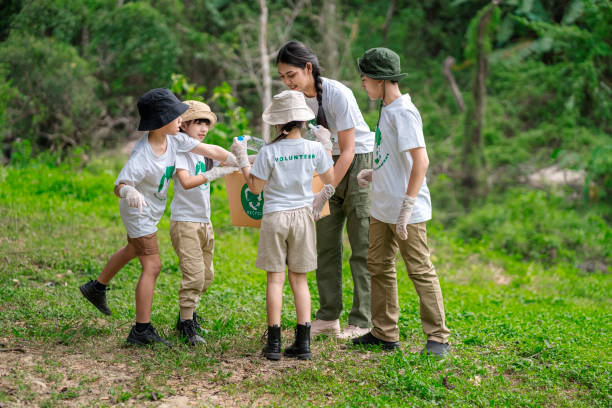
Children hold all the possibilities of their futures in their grasp. However, that future will be in a world becoming increasingly scarce resources.
With all the media coverage about the effects of climate change, pollution, and other issues that adversely affect our planet, the young generation’s responsible for making this planet a better one to inhabit. To improve our create a better tomorrow, parents in Singapore should begin to raise kids who have reached a certain age and are responsible
and empathic towards the world and all its and its. To achieve this objective, parents should be able to fulfill their responsibility to educate their children about the importance of collective thinking over the long term. Actions to their children. The truth is that the schools and teachers will help your child be aware of the impact human activities have on the environmental system on a global scale. However, you can also take this knowledge beyond the classroom and begin in the home and teaching them in addition. To aid you in this endeavor, Here are some suggestions for getting some ways to help your child shape the future of a sustainable and liveable world.
Begin with small habits
The first step in establishing environmental consciousness is practicing small-scale habits at home. For instance, you can teach.
Teach your children that water is a valuable resource that should be preserved. Instruct them to shut off the faucet.
If they don’t need water, for instance, when brushing their teeth. Make sure they are always.
Please turn off the lights and other gadgets or appliances when you aren’t using them. To reduce food waste, you should teach your children to shut off lights and other devices when they are not in use.
A great role model for other children to set a good example for them. Your child’s education in the nearby MOE school or one of the internationally-based elementary schools in Singapore is likely to be encouraged by their instructors to participate in activities that help teach the necessity of protecting the natural environment. This could include school activities that teach children the importance of preserving the environment. A wide-ranging recycling program, an art competition involving recycled materials, and an essay-writing contest on current environmental issues or another issue. Inspire your child to participate in the activities, and you will be able to help. They should also instill in them the importance of the significance of conservation of the environment and sustainability.
Implement Good Waste Disposal Practices
Making good choices with your family can be an excellent method to help your child get familiar with these practices. Implement practices for segregating your waste at home. Sort your trash into categories such as glass, plastic, and paper, biodegradables like food, biodegradables like food, and food waste. Have your child assist you in identifying the waste categories correctly, and offer them a snack or a toy if they do an excellent job. Introduce your child to reusable plastic containers and lunch bags for them to get to are aware of the notion of reuse. If you own an area for gardening, you could make compost using your biodegradable waste like vegetable and fruit peels, eggs, eggshells, and leftovers. It can be turned into the basis of aA fun science experiment that will teach students how soil naturally breaks down biodegradable materials. In addition to practicing proper waste disposal in your home, it is essential to encourage your child to continue practicing appropriate waste removal outside. Instruct them to dump their garbage in the correct segregation bins and then hang the Binson food packaging or containers for food until they come across the trash bin where they are disposed of.
Start Recycling Projects or Donate Unwanted Items
When you’ve accumulated enough recyclables in your house, you are ready to start by making a DIY project together for your children. Look for kid-friendly projects on the internet that use non-biodegradable materials like plastic bottles, glass jars, bottles, toilet rolls, bottles, and cardboard boxes, bottles, toilet rolls, and glass jars. Recycled materials are not just a way to instruct your childThat’s not to say that everything must be thrown away immediately. Also, they can boost your child’s imagination by permitting and creating creative applications for old items. Alongside recycling your items, you could donate unwanted or unneeded things to those in need. EncourageAllow your child to pick the items to donate independently. This can help them avoid excessive consumption and hoarding later in the course. In addition, it will teach them a vital lesson about sharing their possessions and sharing what they have with people with less.
Spend Some Days in Nature
Despite being a highly urbanized city, Singapore has many green spaces you and your family can enjoy. Visit for a quick immersion in nature. Make a plan to visit places like parks and Zoos, conservation areas, or nature reserves that can help your child see the beauty of nature. Apart from that, taking frequent nature excursions can do amazing things to your child’s health and cognitive abilities. Functions. Research shows that exposure to nature for children early in life can lead to improved mental well-being in adulthood. Think about biking, camping or throwing and catching frisbees, taking your dog for a walk, or enjoying lunch in the great outdoors for your child excited about each Nature trip with the family.
Get Them to Do Outdoor Chores
Gardening is an easy method of teaching children the basics of obligations. You can designate a specific area of your garden or an area where you can plant plants, preferably ones that are easy to care for. Plants are a great way to grow it’s more enjoyable to plant seeds to watch them develop.



